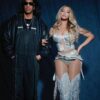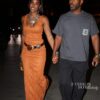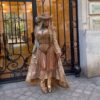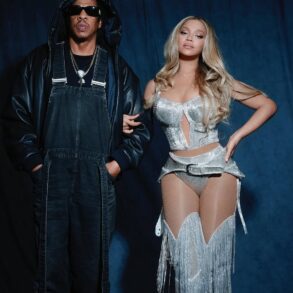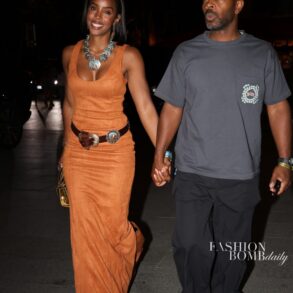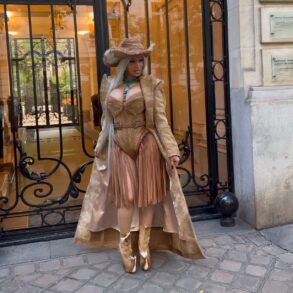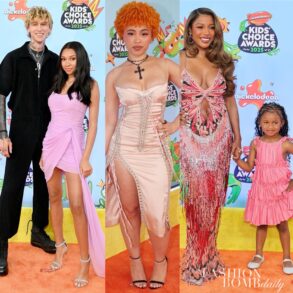Reaching the 25-year mark as an independent New York City-based designer takes some muscle, and even more so if your specialty is hats.
In the sparsely populated field of U.S.-based milliners, Eugenia Kim has built a following for her inventive and at times irreverent styles. To celebrate her brand’s milestone, Kim will host a cocktail party at the Efrain Lopez gallery in TriBeCa Thursday night. There’s also an “Icon” collection in honor of the anniversary that features 12 tongue-in-cheek designs from her repertoire, including an ashtray fascinator, a candy pink felt haircut hat, a distressed leather fascinator with what looks likes an everything bagel with cream cheese and lox, and the Matisse-inspired “Jonah” bucket hat feathered with fish motifs.
“Weirdly, one of my customers for haircut hats is Bill Murray. I had made some for Opening Ceremony’s exclusive men’s collections like one that was [inspired by] a ’70s businessman with sideburns. What I like about these haircuts is they remind me of Lego people hair. He also ordered one that was an Elvis [Presley] style with a little curl on the top,” Kim said.
Raised in Pittsburgh, Kim switched tracks at Dartmouth College from a premed route to creative writing after a monthlong hospital stay for a broken back made her question a profession that required so much hospital time. In the mid-90s heyday of Condé Nast, she took a job as an editorial assistant at Allure magazine and made the most of the corporate tuition reimbursement benefit to take a night class in hat design at Parsons School of Design. Unlike much of fashion, which is machine-made, the fact that hats are handmade, individualistic and three dimensional appealed to her.
Kim wrote front-of-the-book material for Allure after an editor went on maternity leave. “Not very good at working for someone else,” she didn’t show up on time and would duck out to sample sales, but she was a good writer and quick with a pun. (So much so that friends in publishing would routinely call her asking for headline suggestions.) “Then my boss at the time Larry Karol and Linda Wells had an intervention with me to say, ‘You’re wearing lingerie to work.’” I said, “‘But we just wrote about how slipdresses are in.’ I even remember the title, ‘Give Them the Pink Slip.’ And I told them, ‘This is Dolce & Gabbana.’ Remember it was the ’90s. Everybody was wearing slipdresses and it wasn’t like I was working at a bank or something.”
Eventually, Kim did get a real pink slip and lost her job. Still making hats, Kim was walking around SoHo one afternoon wearing one of her hats when a store employee asked where she got it and then asked to see her collection. Unfamiliar with what exactly a collection consisted of, Kim just made the same hat in a bunch of colors. That led to a window display, which someone from Barneys New York later spotted and scheduled an appointment with Kim.
Having once had an editorial internship that involved cycling through several magazines, those connections later led to publicity for her hat designs. After Kim mentioned in a New York Times feature that her hats would be available at Barneys New York — before the order had been confirmed — the hat buyer called her the next day to say, “‘You can’t just say that. We need to get these hats in ASAP now.’”
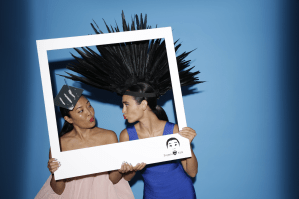
Courtesy of Eugenia Kim
Her fondness for surrealism and all things Elsa Schiaparelli is driven partially by a keen appreciation for punning. Rudi Gernreich is another favorite designer. Schiaparelli, like other keen observers Coco Chanel, Halston and street photographer Bill Cunningham, started out designing hats. Photographer David LaChapelle and stylist Joe Zee were among the talents that first enlisted Kim for projects. “I was doing the ‘Zoolander’ movie and then the cover of W magazine. Those were my roots. I sent Neiman Marcus a look book every season for six years, before they finally said, ‘OK, you’re ready.’ It was because I was making so many unconventional things.”
The black peacock feather mohawk headband that is part of the “Icon” assortment is similar to one Kim recreated for Drew Barrymore to wear to host the MTV Movie & TV Awards — before she stepped aside in solidarity with the striking Hollywood writers. The designer first crafted the mohawk in 1998 by spray-painting the feathers in her apartment. And the ashtray fascinator was first made in 2004, when Kim won the CFDA Perry Ellis award. Feeling at that time that the CFDA was a “very uptown group,” Kim thought a black onyx hotel ashtray “looked like a crown for a downtown girl.” That led to the “Ciggy,” a black satin fascinator with embossed gold and white leather cigarettes with topaz crystal, smoke crystal ash, gunmetal veil and silver and black chain.
“Now that I’ve done this Icon collection, I want to do this every year — put out pieces that are not that commercial,” she said.
The CFDA Award-winner has launched a bridal collection geared for the soon-to-be-married, who prefer to embrace their personal stye. The designer is also debuting a Love Tennis collection that will land in stores in mid-April, which should appeal to her resort-loving customer base and pandemic-prompted tennis and pickleball players. Ironically, developing the highly crafted line has hampered her three-times-a-week tennis habit at McCarren Park and other courts in the city. Given how tank tops, for example, are being cut on the bias with Grecian-inspired pleating, samples can take a week to finesse.
Having lived in the East Village throughout her time in the city, Kim now runs her business from a West 36th Street space, which she has expanded over time. In addition to wholesale, the designer sells her label direct-to-consumer. As for how Kim has managed to keep going, she said, “It’s luck. And you also have to take chances, but you have to outweigh your risks.
“I just moved slowly. I’m actually a fast mover, but I didn’t overbuy or overextend myself,” she said. “What I love about millinery is that you can create these really amazing pieces and then create something really commercial. I can see what I can make for Celebrity ‘A’ to The Met. That’s the beauty of what I do because I have an atelier here and overseas factories that can produce 1,000 units of something.”
Most of her sales are cosumer-driven, aside from the occasional custom piece for Beyoncé or Taylor Swift. Individual styles could take anywhere from one week to 20 minutes, depending on the style. Kim’s most searched item for the past few years has been the Mirabel, a $495 straw sun hat with a modern mold and a grosgain ribbon. “Our customer has a very resort lifestyle. They like to post images of themselves on a beach or in fields of lavender, wearing these romantic hats,” she said.
Self-funded, Kim revels in the freedom of running her own business without having to answer to anyone else. The team of 15, which includes her design director husband Christopher Lee, routinely riff off each other’s ideas and polish them up, she said. Never at a shortage for ideas, she works “very socially” and is on the same page with her staff. Collaborating with other designers, as she did with L’Agence’s Tara Rudd Dann for a recent shoot, is inspiring. Speaking with buyers, stylists and customers also does the trick, since Kim likes to create things women really want to wear.
Her own style relies on brands like Gucci, R13, old Miu Miu, Phoebe Philo-era Celine and Yohji Yamamoto. As much as she loves Daniel Roseberry, she is partial to old-school Schiaparelli and Gernreich’s designs. Kim’s husband designed the dress she will wear to Thursday’s 25th anniversary party and her sample maker created it.
Licensing out the lower-priced diffusion Genie by Eugenia Kim line that was suspended after post-COVID-19 shipping costs rocketed is something she would like to do. Branching out into other accessories is also on her to-do list, as well as non-tennis clothing true to her style.
Looking back, Kim said she never expected to work in fashion for this long. “I told my parents, ‘Let me just try this out for six months or a year. If I don’t succeed, I’ll just get another job,’” she said. “Then I succeeded and I just figured I would ride this out until I have to go back into the real world.”
This post was originally published on this site be sure to check out more of their content.

